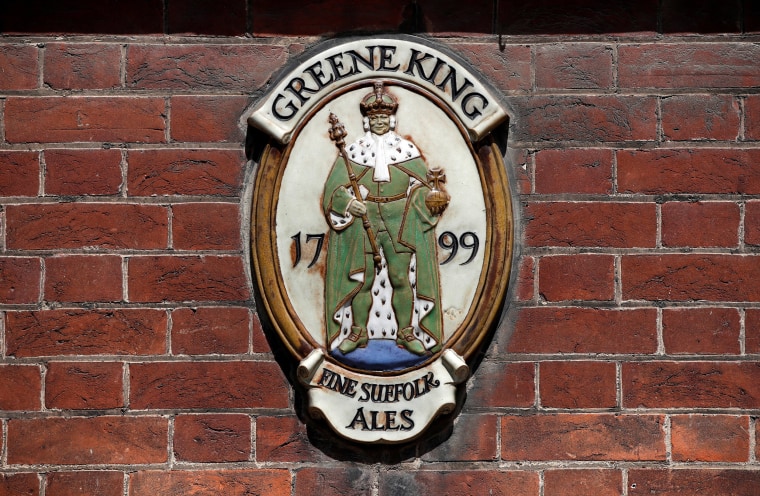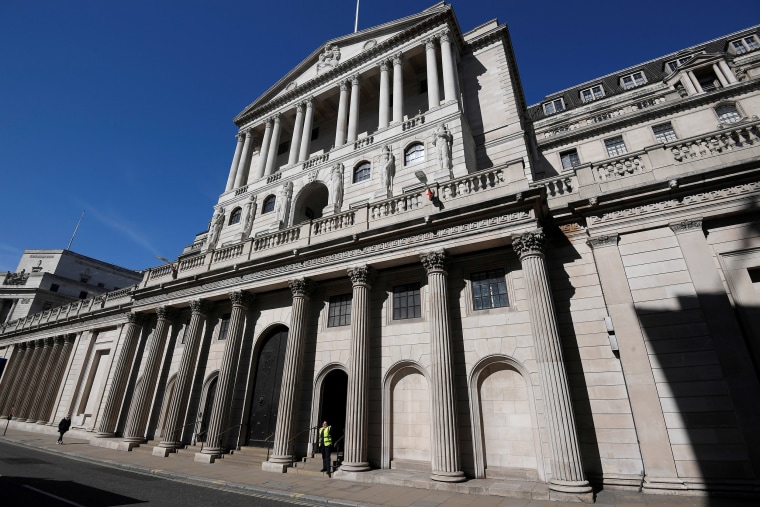Too little, too late?
As a number of British institutions and corporations respond to Black Lives Matter protests with pledges of reparations for their historic links to slavery and exploitative colonialism, some are asking whether their moves are no more than "empty gestures."
Calling it "an unacceptable part of English history," the Bank of England issued an apology late Thursday for its leadership's involvement in the slave trade during the 18th and 19th centuries.
"As an institution, the Bank of England was never itself directly involved in the slave trade, but is aware of some inexcusable connections involving former Governors and Directors and apologizes for them," a spokesperson for the bank said in a statement to NBC News.
The names and images of former governors and directors involved in the slave trade would be removed from display, the statement said, adding that the bank would work with its staff, particularly Black and other ethnic minorities, to find ways to be more inclusive.
"That's not an apology," Kehinde Andrews, a professor of Black studies at the Birmingham City University, said. "It's frankly offensive."
Characterizing the bank as not having a direct hand in the slave trade minimizes its role in the financing of those involved, he added.
The Bank of England's announcement followed similar pledges by the insurance firm Lloyd's of London and Greene King, a brewery operating more than 2,700 pubs, restaurants and hotels across the United Kingdom.
Lloyd's delivered an apology June 10 for its involvement in the slave trade, while promising to take "meaningful and measurable action" by investing in Black talent in its industry and financially supporting charities involved in Black and minority communities. It also said that it would ensure it upholds nonracist policies.
For Andrews, that's not enough to compensate for the company's history of insuring slave ships and hosting a pickup point for the return of runaway slaves in London.
"I don't think Lloyd's could actually do anything short of give all of its money to Black communities to atone for its role in slavery," he said.

Greene King Chief Executive Nick Mackenzie said in a statement the company would make "a substantial investment" to benefit the Black and minority ethnic, or BAME, community through its partner charities, while acknowledging one of its founders had profited from slavery and argued against its abolition.
However, Andrews said these commitments come across as "empty gestures."
"Lloyd's, the Bank of England are talking about diversity as though that's some kind of solution. Lawyers say they're going to donate to charity but no one puts a figure on it, " he said. "It's about PR. It's not actually dealing with the problem."
The Bank of England and Lloyd's said they had nothing to add to their initial statements. Greene King did not initially respond to requests for comment.
But Tara Van Ho, a lawyer who specializes in business and human rights at the University of Essex, said reparations can be done right.
As an example, she said that Swiss banks were sued in the United States and ordered to pay $1.25 billion in 1998 to hundreds of thousands of Holocaust survivors who had their wealth stolen by the Nazis during World War II.
That case and others like it worked because the corporations came together to provide compensation, preventing a "splintered" uneven effort, she said. Victims had an equal voice and involvement in its distribution, she added.
But Van Ho also cautioned that she had seen reparations done poorly, with businesses choosing a figure based on their bottom line and processes that benefited them, leaving communities hurt over unfulfilled promises.
Without a figure attached to the promises of reparations offered by corporations in recent weeks, Van Ho said "the lack of detail does make it difficult to scrutinize."
"Right now, they get the benefit of the doubt, but with a healthy dose of skepticism," she said.
Andrews also cautioned that the practice of providing reparations could undermine important discussions about today's inequalities.
“The problem with these gestures is it suggests, 'Oh, a few people did some bad things in the past and everything's fine now.' No, everything's not fine,” he said.
“The fact that people in the 21st century need to remind everybody that Black Lives Matter just tells you that the system hasn't changed at all.”

